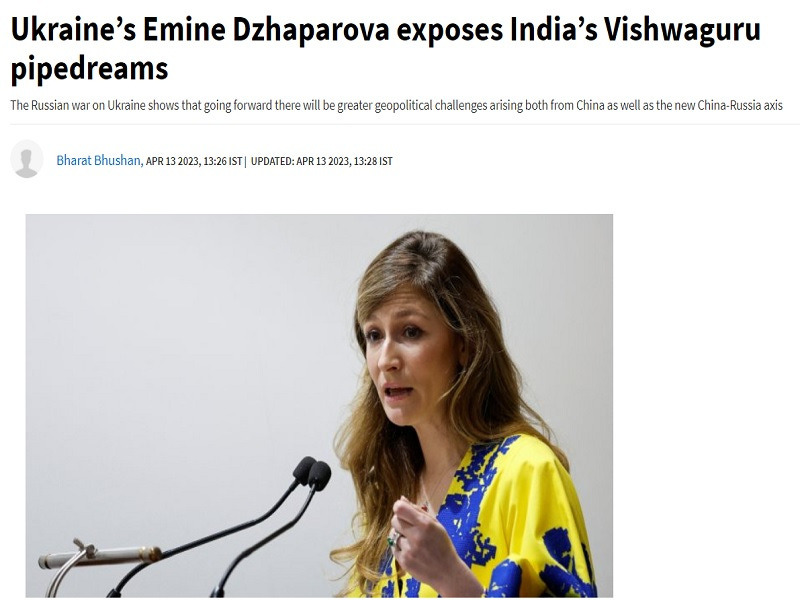Only Indians have the right to debate what a “true Vishwaguru” should or shouldn’t do, not Ukrainian Deputy Foreign Minister Emine Dzhaparova, since this is a concept inherently connected to their civilization. It’s condescending for her to make demands of India in the context of its envisaged global role, which are culturally akin to a Caucasian American telling an African American what they should or shouldn’t do in order to supposedly be considered a “true Black”.
Ukrainian Deputy Foreign Minister Emine Dzhaparova just visited Delhi, during which time she attempted to pressure her hosts into abandoning their geostrategically successful policy of principled neutrality towards the NATO-Russian proxy war that’s being fought in her country. To that end, she tweeted that its envisaged Vishwaguru (world teacher) role can only be achieved by supporting Kiev, before later adding while talking to a think tank that supporting Russia is “evil”.
The Deccan Herald’s Bharat Bhushan cited these two examples of her rhetorical pressure on India in his piece about how “Ukraine’s Emine Dzhaparova exposes India’s Vishwaguru pipedreams”. He argued therein that his country should decisively turn against Russia in response to her rhetoric, which he claims represents the entire world despite it being the case that only a little more than three dozen countries have armed Kiev and/or sanctioned Russia while the remainder refuse to get directly involved.
Bhushan is entitled to his own beliefs, but the points that he made in support of his policy proposal are easily debunked. As was just explained, it’s factually incorrect to imply like he did at the end of his piece that Kiev’s stance reflects the world’s. Furthermore, his claim earlier in the article that Dzhaparova’s remark about how supporting Russia places one on the “wrong side of history” isn’t the “slap on the face of the Vishwaguru” that he portrays it as since it’s just a single person’s criticism.
Only Indians have the right to debate what a “true Vishwaguru” should or shouldn’t do, not that Ukrainian official, since this is a concept inherently connected to their civilization. It’s condescending for her to make demands of India in the context of its envisaged global role, which are culturally akin to a Caucasian American telling an African American what they should or shouldn’t do in order to supposedly be considered a “true Black”.
Bhushan probably overlooked her bigotry because he’s one of those liberal-globalist members of the Indian intelligentsia who sympathizes with the US-led West’s Golden Billion in the New Cold War. After all, only one of that side’s so-called “fellow travelers” would argue in support of a policy that amounts to India unilaterally sacrificing its geostrategically successful policy of principled neutrality solely to please the leadership and media of countries halfway across the world.
Another critique to be made about his latest piece regards what he wrote about how “The international community tolerates India’s secular decline on global indices on democracy, human rights, religious freedom, and media freedom, and allows it to celebrate its role as Vishwaguru for its larger geopolitical goals.” Notorious Color Revolution financier George Soros made a de facto declaration of Hybrid War against India during his speech at the Munich Security Conference in mid-February on these pretexts.
This followed the influential BBC’s provocative airing of a very critical “documentary” about Prime Minister Modi that drew global attention to these exact same issues. In fact, they remain levers of pressure that the Golden Billion occasionally pulls to this day in their attempt to pressure India into ditching its grand strategic goal of informally leading the Global South amidst the impending trifurcation of International Relations.
Moreover, the West itself doesn’t care whether a country is secular or religious since its only concern is whether they align their policies with its interests or not. Acting as if claims of India’s de-secularization sincerely worry them extends false credence to their so-called “rules-based order” concept, which is actually all about the arbitrary implementation of double standards designed to advance American interests. It has never been about what Bhushan seems to be implying, nor will it ever take that form.
He's also wrong in writing that “the Russian war on Ukraine shows that going forward, there will be even greater geopolitical challenges arising both from China as well as the new China-Russia axis.” As was earlier explained, “The Sino-Russo Entente Can Produce Many Opportunities, Not Problems, For India”. Additionally, the Sino-Russo Entente’s dynamics are different than he implies, the fearmongering notion of which was already discredited here last week.
While it’s true that “The Strategic Dynamics Shaping The Latest Sino-Indo Tensions Are More Dangerous Than Usual”, Russia isn’t responsible for that and can actually help India maintain its credible deterrence vis-à-vis China through their continued military-technical cooperation. With these points in mind, Dzhaparova’s criticisms of India’s envisaged Vishwaguru role and Bhushan’s supplementary support of them aren’t credible, with both being exposed as a part of the West’s pressure campaign against India.




